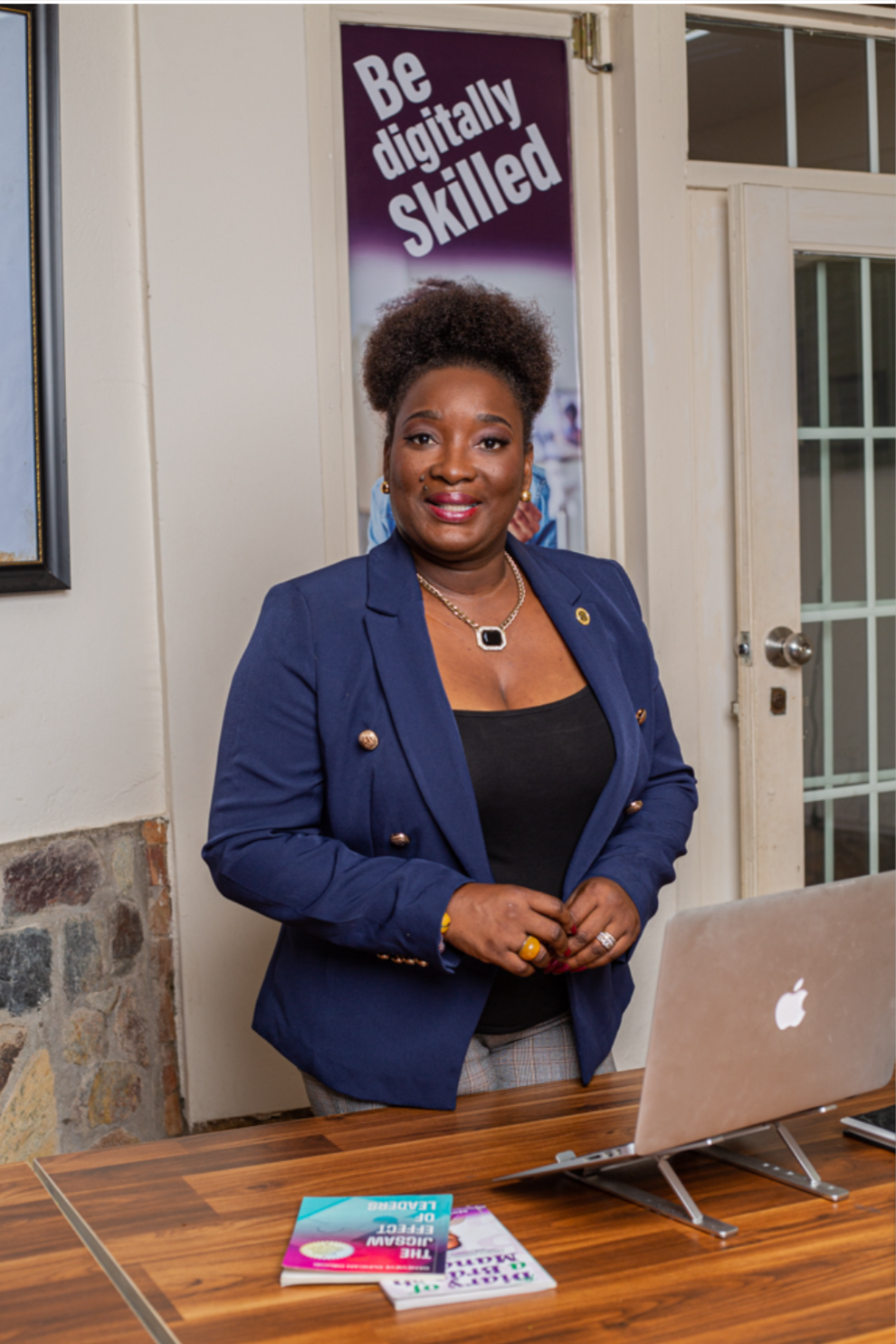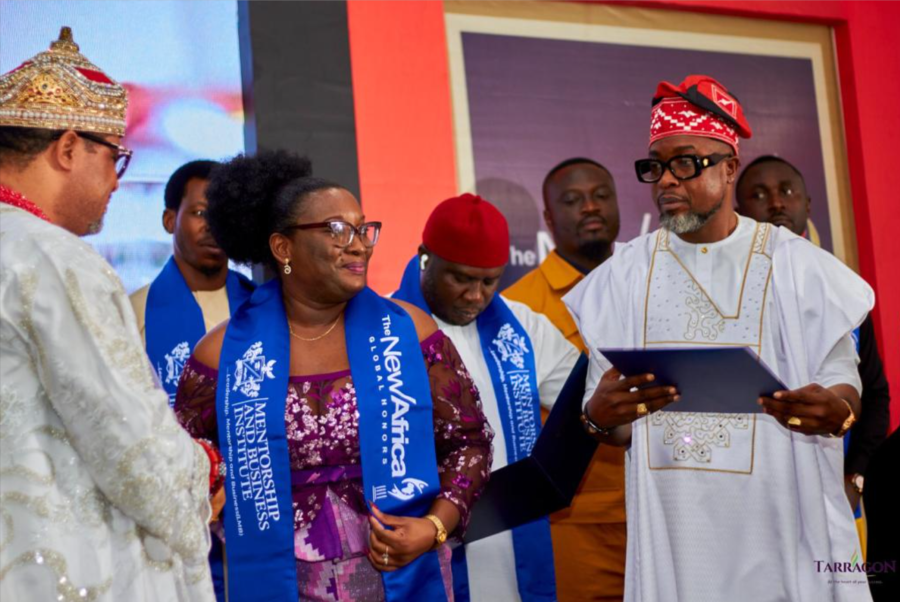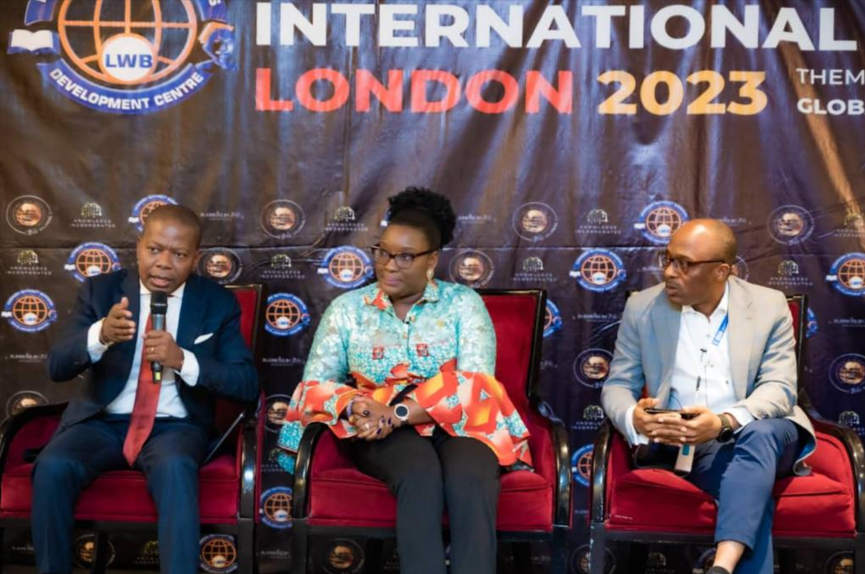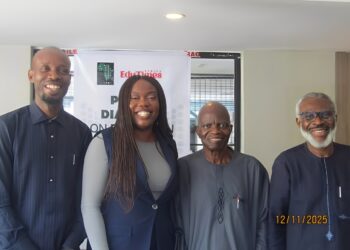
Please tell us a little about yourself. Who is Dr Genevieve Pearl Duncan Obuobi?
Dr. Genevieve is a young African woman. I describe myself as an authentic African woman because I’m proud to be an African and I’m born to a family from the Akan traditional part of Ghana. My dad is a traditional ruler, the chief of Agona Duakwa with the stool name Nana kojo Amoakwa V, hence Genevieve is a Princess(giggle). Genevieve is the second of five children. We are three boys and two girls, I’m the first of the girls. And I’ll say I took up leadership responsibilities quite early. My mum used to travel a lot whilst we were young. So, I always say that our last one, who is now a big boy of 31 years, is my first born, as I took care of him since he was a baby. I was about 12 years when I started playing the motherly role to my siblings and also taking care of the home. Genevieve is a Christian.
Genevieve believes that nothing is impossible, once you put your mind to it. A strong advocate for leadership, especially youth and women leadership, coaching, and assisting with the recalibration of the young African youth’s mindset with regards to leadership and service delivery.
Genevieve is a professional banker with a decade and half experience in foreign and retail banking. I am also an author and a columnist in the BnFT (Business & Financial Times), Ghana.

I’m very passionate about financial empowerment of women, and love to reiterate that a lot. So not just empowerment of women, but financial empowerment. So that together, when we bring our bit and our men bring their bit, it makes life beautiful. Diversity makes it beautiful. So basically that’s who Genevieve is.
So, are you still a banker?
Full time, no. I still do stuff as a banker. I mean, I consult in the financial sector. I help people build their wealth. I train bankers, but I’m not a full time banker since 2021 when I resigned from Fidelity Bank Ghana Limited after 13 years of great growth and service, thanks to my leadership and wonderful coaches.
Your profile is quite impressive and reveals a heavy leaning towards business administration, management and leadership. Was it always your ambition to become a business administration expert? And two, what led you to taking this career path?
Thank you. So, I wanted to actually become a pediatrician. I wanted to take care of kids when they are sick. I read Science in the Secondary School, Aggrey Memorial Secondary, Cape Coast, Ghana. I read Elective Maths, Physics, Chemistry and Biology. However, I believe in the saying that when life throws lemons at you, you make lemonade out of it. I always say I’m a disappointed medical doctor but lo and behold, with focus I still became a doctor, (of books) I love to seek knowledge.

Okay, so growing up, I think I always wanted to read the Sciences because I was really skewed towards kids and I wanted to take care of them, especially when they are unwell. Like I said, I started taking care of my siblings at an early age, so I saw it all when they were sick in addition to getting them medication from the hospital and taking care of them till they felt better. It brought so much joy, seeing them well again.
I didn’t make the grades to be offered Biological Sciences at Legon, Ghana’s premier university. I decided to re-write Biology to enable me to get the preferred course, upon motivation from my parents, especially my mum. After resisting to re-write my Biology in that year, I finally had to due to my mother’s persistence. After re-writing, I had to wait for a year to get the results released, and then re-apply. I decided to enroll on an online programme based on my mother’s advice on not being ideal, so the devil doesn’t find work for me (as we believe) I enrolled in management and front office administration from the Institute of Commercial Management (ICM),UK. After the course, I had the opportunity to work at the Treasury Back Office at Ghana Commercial Bank as a contract Staff.
The feeling and satisfaction that came with the banking job was great, and since my dad was a Banker then – Dad worked as a banker for about 40 years – the profession was already attractive to me. Hence switching from Science and later deciding to read my Bachelor of Business Administration at GIMPA, was how my career began. I love the path I finally chose, and I thank God in all things.
My next question is, because of the propensity for African political leaders for corruption, mismanagement, and having a negligible sense of accountability, it has been suggested in Nigeria that the study of ethics be made compulsory in the school curriculum. Your doctoral project paper was partly titled, The Impact of Customer Relationship Management on Customer Satisfaction. Now, what do you think about adding the study of customer service to what our politicians and our leaders should learn before taking on leadership? Because at the end of the day, they don’t really see us as their customers.
Hmmm, that’s a heavy one. So first of all, I will look at it from the ethics question or the ethics part of it. I think for me, leadership – I mean, you’ve spoken about some of the challenges Africa faces in terms of accountability, corruption and all that. I will first of all like to say that it’s not just Africa though. It’s worldwide. It’s just that there is a heavy lean on Africa because our systems and structures are not well put in place, so it’s easily seen. Elsewhere, when a leader is found liable of some of these vices, due to the systems put in place, the leader is held and handled by the system in place. More often than not, they are able to even jail these public officials. Whereas unfortunately in our part, there is too much freedom, hence we are not able to try them when they are at fault. This makes the rules and adherence to them quite loose in Africa.

The second bit is that ethics as a subject matter should be for all levels especially right from the age of 5 (Preschool). Ethics helps with mindset development, and shapes our integrity value very well. You know that you have to do it this way not because Genevieve is watching you, not because somebody is overseeing what you’re doing, but because it’s part of you, you need to get it done, it’s embedded. That is why I would say ethics as a subject should be taught right from day one at school.
In banking we have codes and ethics, and I guess all professions have them too? Likewike, at my company Tarragon, we have our code of ethics (the do’s and don’ts). When we start teaching our kids ethics right from the word go, they will grow up with it and they will understand that there are values. Cultural values aside, there are my personal values and I need to know that if I live in a society, I cannot think about myself and my family alone. I should also think about others because there is a ripple effect when others are not okay. I must understand that the ripple effect is going to be on me, my family and my loved ones . This is the desired mindset and I think that is one role ethics plays on us as humans.
As regards the second part of the question, customer centricity is something that applies to everyone. And for leaders, for government officials, for public servants, for private organizations, for business leaders, whoever you are, I think customer centricity is something that you should know, understand, and work with. Customer centricity, in a way, goes together with customer satisfaction. Because if you are not focusing on me, there is no way you can do things with the focus on my satisfaction. So as a public servant, as a politician, remember that you are there to serve because you cannot lead without serving. Therefore, as a leader, for you to lead effectively and efficiently, you need to be customer centric. You must understand the people you are working for or the people you are serving. Once you understand that your leadership in a way is measured by the satisfaction of your people, what happens is that you become more skewed towards driving joy in satisfying your people – thereby listening to your citizens or your team members.
Now, what can be done about this? I have always held the position that from day one, we are not grooming leaders. And that is unfortunately why we don’t have the stock or the pool of people that have been brought up, groomed, and have been nurtured in a way that when they take up leadership roles in Africa, we will all be happy. This is because self -centeredness, the take it alone syndrome, acquire it alone syndrome, enjoy it alone syndrome is so much embedded in us as a people and society, unfortunately. And that is what our kids are seeing as they grow and once they are not being shaped intentionally otherwise, they grow up, they take these leadership positions and they also do the same because that is what they saw being done.
But the question I pose to leaders is this. When we see a problem, how do we fix it? How do we solve it? How do we become problem solvers and not just problem identifiers or complainants? What are you doing intentionally in my small way, to help change the narrative?
Anyway, in my own little corner, I believe as a leader I can start the change and others can also follow suit in different ways as we all pursue the focus on getting it in a better way than we have seen.
I have a leadership club. It starts from age 5 to 12 years. The whole idea is that I think growing up as an African youth, I saw a few good things, great societal norms and values, which unfortunately have reduced drastically. It’s not totally lost though, and I wish to see it once again highly gaining momentum in our African societies again. I think as a people, we have allowed the infiltration of culture to have too much influence on us (unfortunately we have skewed too much towards that and this is taking some of our values away). So now, instead of being more family-centered and more focused on community, which is the African heritage, we are becoming more individualistic as a society. That is not the African culture, that is not part of our values. So in my own small way I think by teaching these young people how to work in teams, how to work together, how to use collaboration instead of competition to work together, also trying to embed in them God-centeredness, that whatever you do remember that there is a day of accountability.
Whatever you do, remember to think about the next person because even if it does not affect you directly, it will affect your generation. That is the kind of mindset and we must all take it upon ourselves, in our own little way to start making that positive impact on our society. We may not see the real effect today but in a few years, these children that I’m taking through this reorientation will grow up. They’ll become adults. They’ll take up leadership positions in schools, at workplaces, on the community level, on the societal level, national level and international level. And because they’ve been brought up in this way, it’s embedded in them. It’s part of them. So then ethics comes in, values comes in. And then they would understand that they are actually working for the good of everyone, not for themselves and their family alone. So that is how I want us to look at some of these things, so that we don’t take them in isolation, so we don’t take them as standalone.
A 2022 UNESCO report put the number of out -of -school children in Nigeria at approximately 20 million. That’s a staggering 20% of our population. The highest globally as well. Ghana is doing far better with just 1 .2 million out -of -school, which comes to about 3 .6% of the population. What do you think can be done to reduce these numbers still, whether in Ghana or on the African continent as a whole?
First of all, we are all trying to get our numbers better, I wish to say we should all focus on higher benchmarks in terms of countries in our continent doing better, so we learn from best practice. Ghana may be doing well, but we can do better.
However, I believe our socio – economic factors, lack of infrastructure, poor service and remuneration packages to the teachers and also incentives in some cases to parents who are deprived are a few of the reasons for our slow or very low rates. Currently in my country Ghana, there is now free SHS. This means once you are qualified to attend SHS, you get admitted for free, no fees at all (food, tuition is totally free) This is good and other countries can learn from it, as I believe if this strategy is handled and managed well, it will enhance the percentages and it means we will be empowering many more people to have access to education. However, even at this point, quality for me is important. It is not just giving access to education, but the quality of education in question must be our focus as nations. So from what I know in the developed world, the free educational system is managed effectively in the way that it is sustainable. For instance, if I live in a state in the US, let’s say Connecticut, or Glastonbury and Hartford, I cannot take my child to a free school miles away from my postcode. This I believe is very fair, because every state pays some taxes to ensure their communities improve in different areas etc. I believe also that taxes are paid on the basis of some classification. Hence, if I live in a high networth suburb and I pay high taxes to improve quality education, etc, I am paying for that due to the role I know my taxes are playing in free education, so why should someone not contributing in the payment of the same level of taxes enjoy the same benefits? Simply, I know we learn a lot from our developed countries, but I believe we should adopt some of these things in a very practical way to ensure quality and sustainability.
Another thing I would love to highlight is infrastructure. It’s a serious problem that poses major challenges across Africa. A teacher who is passionate about teaching lives probably 20 or 30 kilometers from the school. The roads are so bad. By the time the teacher sits on Okada or joins a “trotro”(typical public bus) and other forms of public transport to get to school, the teacher is already tired. How then does the teacher deliver quality to our children, when his demeanor and mental state right from beginning isn’t the best? So infrastructure across Africa is a problem. And this is something that I think is affecting our educational system.

Another challenge is with young children being made to work; so we’re talking about child labour. In most of our African communities, parents don’t see the need to take their children to school because they can go to the farm instead. Although we have evolved as nations and have become better than some years back, people are still living in deprived communities. So when looking at the 20% and the 3.6% statistics as per the UNESCO data we must still remember that the majority of our communities are very deprived. They remain underdeveloped and these parents will wonder why their child should go to school if he or she can go and sell something (hawk) on the streets or in the market and make money that can contribute to taking care of the family. Why then do I need to work myself to the bone to send a child to school? And after this, the next question is, even when the child finishes school, what job is available for the child to do? I will say the focus should be on incentives that we can use to persuade parents who think there is no point in sending their child to school, even though it’s free as we currently do in Ghana. This I believe is not only a government responsibility, but that of civil society too. NGOs and private companies can focus on building capacity in parents, educating them and adding incentives in communities they have businesses in. All these will go a long way to support our quest to improve the low percentages.
Education is the best way to empower the next generation of leaders, so as Africa leaders looking into the future, I think we all have a role to play in ensuring education for all and this can be formal or informal, especially in a technological environment we have today. Let me use this platform to also encourage more of our youth to venture into the technical and vocational institutions, so as to solve societal problems in a more practical way and help reduce the increasing unemployment levels across our continent.
You can read the concluding part of Dr Genevieve Obuobi’s exclusive interview in our November issue.
_______________________________
Dr. Genevieve Pearl is a multiple award winner in Banking, Leadership and a light bearer for African Women.A versatile international speaker and panel moderator. She is listed as one of the 100 most impactful change makers in Africa by Humanitarian Awards Global 2023, and listed amongst the 40 most influential female leaders in Ghana 2020. She is a Customer Experience Strategist, Corporate Trainer and an SME consultant with great passion for gender financing and youth leadership. She is an Enthusiast of SDGs 5,7,8 and 17. She is currently the Lead Consultant of Tarragon Edge Limited. Prior to her new role, she worked with Fidelity Bank Ghana Limited were she managed flag ship branches and was known for her exceptional service delivery experience. Her expertise are in personal and team development, leadership, customer experience, partnership brokerage, writing and management consulting. Dr. Genevieve is an alumnus of the Swiss Business School Zurich, Switzerland where she earned her Doctorate in Business Administration, and the University of Ghana, Legon where she had her Masters Degree and GIMPA for her Bachelors in Business Administration. She is also management certified by CEIBS, Shanghai, Cranfield Management - UK and Harvard, USA. She is a fellow of the Chartered Institute of Leadership and Governance, USA (Ghana Chapter) Dr Genevieve is a columnist in the Business and Financial Times in Ghana, the Author of The Jigsaw Effect of Leaders and The Diary of the Branch Manager. She is also a co-author of Who moved my heels and My Africa, my Identity. She enjoys sharing knowledge writing, traveling and listening to good music.


















































































 EduTimes Africa, a product of Education Times Africa, is a magazine publication that aims to lend its support to close the yawning gap in Africa's educational development.
EduTimes Africa, a product of Education Times Africa, is a magazine publication that aims to lend its support to close the yawning gap in Africa's educational development.